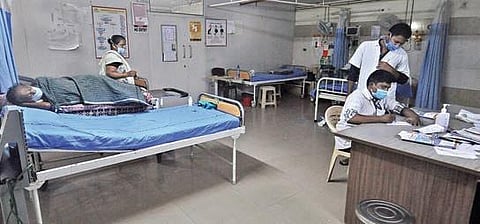

NEW DELHI: With Covid-19 cases surging in India, more hospitals are getting diverted to treat the infected patients — suggesting that non-Covid healthcare services that have been badly affected in the pandemic could get hit further.
An analysis of the figures on Covid-19 health facilities by the Union Ministry of Health suggests that in last one month, there has been an increase of over 22 per cent in the health centres that are meant exclusively or mainly only for moderately or severely sick due to Covid-19 across India.
In other words, within a month, there is a further decline of more than 22 per cent in hospitals that would have catered to other patients.
On May 7, a month after the Centre decided to prepare a three-tier healthcare delivery system for Covid- 19, the number of Dedicated Covid Hospitals and Covid Health Centres stood at 2,719.
As on Friday, this number has reached 3,319 with 957 earmarked as DCHs and 2,362 designated as CHCs as the number of active cases has reached 1,10, 960. It shows, that within a four week period, 600 hospitals across India have been diverted to treat mainly Covid-19 patients.
As per health ministry’s definition, DCHs are either full hospitals or separate block in a hospital for Covid-19 patients clinically assigned as severe and are meant to have fully equipped ICUs, ventilators and beds with assured oxygen support.
Their number is 957 now — 136 more than what it was on May 7.
The number of CHCs, which are also either full hospital or a separate block in a hospital, are the ones that have beds with assured oxygen support and are meant for moderately sick Covid-19 patients.
There is another category of health facilities - Covid care centres—with simple isolation beds which are to serve mild patients who want or are prescribed institutional isolation. Their number stands at 7,529 as of now.
Officials in the health ministry conceded that other non-essential and even essential healthcare services have taken a backseat in the last several weeks and the situation could get even worse in days to come.
“As cases climb, especially in cities and states which are getting overwhelmed with the daily rise in Covid-19 cases, needs of millions of others needing healthcare could be ignored and that means more suffering, bad disease outcomes and even deaths for thousands and thousands,” a senior official told this newspaper.
He pointed out that situation is mainly worrisome in cities like Mumbai, Delhi, Ahmadabad, Chennai and Pune among others where health infrastructure is struggling to cope with the rising cases of infection.
Another official pointed out that many hospitals that had almost shut down during the initial period of lockdown have now got converted into Covid facilities.
Public health experts meanwhile stressed that since a large number of those succumbing to the infection are those with non-communicable diseases like diabetes, cardiovascular conditions, ensuring continuum for care for those with multiple morbidities is paramount.
“One strategy that could be considered is developing a database of those with NCDs or chronic conditions who were on treatment or hospitalized in the past year and proactively contact them to check on their health status and need for follow up visits and medications,” said Dr Oommen John, a public health researcher with the George Institute of Global Health in New Delhi.
“Considering home delivery of medicine refills will ensure that they continue on their treatment and also front line health care workers should focus on routine healthcare delivery so that essential services can continue while the contact tracing and testing activities are undertaken by special public health response teams,” he added.